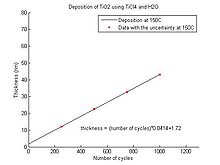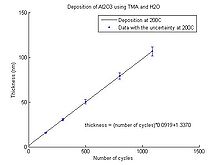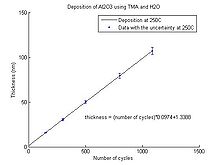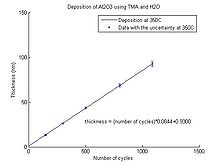Specific Process Knowledge/Thin Film deposition/ALD/TiO2 deposition using ALD: Difference between revisions
No edit summary |
No edit summary |
||
| Line 41: | Line 41: | ||
<gallery caption="Aluminium oxide thickness as function of number of cycles" widths="220px" heights="220px" perrow="5"> | <gallery caption="Aluminium oxide thickness as function of number of cycles" widths="220px" heights="220px" perrow="5"> | ||
image:ALD_TiO2_grow_rate_150C. | image:ALD_TiO2_grow_rate_150C.jpg| Temperature 150 <sup>o</sup>C. | ||
image:ALD Al2O3 grow rate 200C.jpg| Temperature 200 <sup>o</sup>C. | image:ALD Al2O3 grow rate 200C.jpg| Temperature 200 <sup>o</sup>C. | ||
image:ALD Al2O3 grow rate 250C.jpg| Temperature 250 <sup>o</sup>C. | image:ALD Al2O3 grow rate 250C.jpg| Temperature 250 <sup>o</sup>C. | ||
Revision as of 14:53, 6 May 2015
THIS PAGE IS UNDER CONSTRUCTION
Feedback to this page: click here
The ALD window for depostion of Titanium oxide ranges from 120 oC to 350 oC. XPS measurements shows that at temperatures below 120 oC the TiO3 layer will be contaminated by Cl molecules.
All results shown on this page have been obtained using the "TiO2" recipe on new Si(100) wafers with native oxide:
Recipe: TiO2
Temperature: 150 oC - 350 oC
| TMA | H2O | |
|---|---|---|
| Nitrogen flow | 150 sccm | 200 sccm |
| Pulse time | 0.1 s | 0.1 s |
| Purge time | 3.0 s | 4.0 s |
In the graphs below the Al2O3 thickness as function of number of cycles for deposition temperatures between 150 oC and 350 oC can be seen. From the equations the number of cycles required for a certain thickess can be calculated.
- Aluminium oxide thickness as function of number of cycles
-
Temperature 150 oC.
-
Temperature 200 oC.
-
Temperature 250 oC.
-
Temperature 300 oC.
-
Temperature 350 oC.
In the graphs below the TiO2 thickness as function of number of cycles for deposition temperatures between 150 oC and 350 oC can be seen. From the equations the number of cycles required for a certain thickess can be calculated.
- Titanium oxide thickness as function of number of cycles
-
Temperature 150 oC.
-
Temperature 200 oC.
-
Temperature 250 oC.




